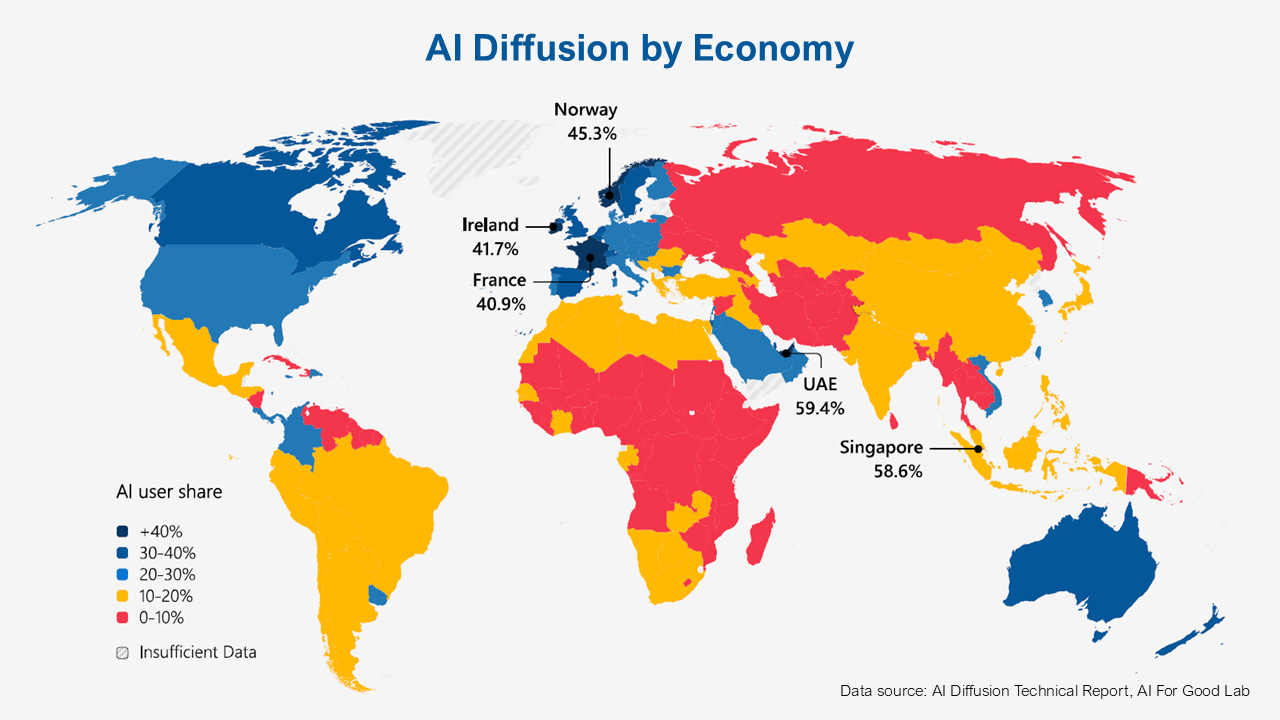UAE leads world in AI adoption rates
Microsoft study shows 59.4% of working-age population in UAE using AI tools
#UAE #digitaltransformation - The UAE ranks first globally in artificial intelligence adoption with 59.4% of the working-age population now using AI tools, according to a new AI Diffusion Report released by Microsoft’s AI for Good Lab. Singapore was placed second with 58.6% adoption, followed by Norway and Ireland. The report highlights that strong infrastructure, policy coordination and digital readiness can drive rapid adoption, even without frontier-level model development or datacentres. The study shows global AI adoption has reached over 1.2 billion users in less than three years, making it the fastest-spreading technology in history.
SO WHAT? - Years of strategic investment in digital infrastructure, education and AI-ready policy frameworks have enabled UAE AI adoption to rise to the highest levels in the world. Although there are a number of fast-growing regional competitors, adoption levels across the Middle East remain much lower than the UAE’s For example, according to Microsoft’s report, Qatar stands at 35.7%, Saudi Arabia at 23.7%, Kuwait at 17.7% and Egypt at 12.5%. The results offer further validation of the UAE’s forward-thinking approach of coordinated policy, digital programmes, education and infrastructure development.
Some key facts about the new report:
The UAE ranks first globally in AI adoption with 59.4% of working-age population using AI tools, according to a new AI Diffusion Report released by Microsoft’s AI for Good Lab. Business people in the Emirats routinely use tools such as Microsoft Copilot, ChatGPT, Claude, Gemini and Midjourney.
Singapore placed second with 58.6% adoption amongst working-age adults, followed by Norway and Ireland, with these nations demonstrating that strong infrastructure, policy coordination and digital readiness can drive rapid adoption without frontier-level model development.
Other Middle East nations featured in the study include Qatar with 35.7% adoption, Saudi Arabia with 23.7%, Kuwait with 17.7% and Egypt with 12.5%, showing growing regional momentum in digital transformation.
The report introduces two new measures: the AI Frontier Index measuring the world’s leading frontier models by performance and innovation, and the AI Infrastructure Index capturing where capacity to build, train and scale AI exists.
Global AI adoption has reached over 1.2 billion users in less than three years, making it the fastest-spreading technology in human history, surpassing adoption rates of the internet, personal computer and smartphone.
AI adoption in the Global North is roughly double that in the Global South, with the gap widening sharply in countries where GDP per capita falls below $20,000, whilst some Global North countries show over 50% working-age adoption compared to below 10% in parts of Sub-Saharan Africa and Asia.
The United States and China together host 86% of global datacentre capacity, underscoring concentration of AI infrastructure foundations, whilst only seven countries—USA, China, France, South Korea, UK, Canada and Israel—rank among the top 200 AI models.
Language barriers are emerging as adoption obstacles, with nations where low-resource languages dominate showing lower adoption even after adjusting for GDP and internet access. Meanwhile, nearly four billion people lack the basic electricity, connectivity and computing foundations needed to use AI.
ZOOM OUT - Microsoft’s AI for Good Lab recently opened its first Middle East location in Abu Dhabi to collaborate with nonprofit organisations on economic and societal challenges across the Middle East and Africa. Established in 2018 to apply AI solutions toward UN Sustainable Development Goals, Microsoft’s global lab programme focuses on environmental sustainability, public health, disaster response, human rights and cultural heritage preservation. One of the priorities for the Abu Dhabi AI for Good Lab is the development of large language models for underrepresented regional languages to reduce the global language divide, goals include applying AI to high-resolution geospatial data for disaster preparedness, climate resilience and food security.
[Written and edited with the assistance of AI]
DOWNLOAD
Read more about AI adoption:
Saudi Arabia & UAE lead in sovereign AI adoption (Middle East AI News)
UAE AI usage jumps to 80% among professionals - LinkedIn (Middle East AI News)
Saudi, UAE manufacturers lead GenAI adoption (Middle East AI News)
UAE embraces GenAI media content, West remains wary (Middle East AI News)



